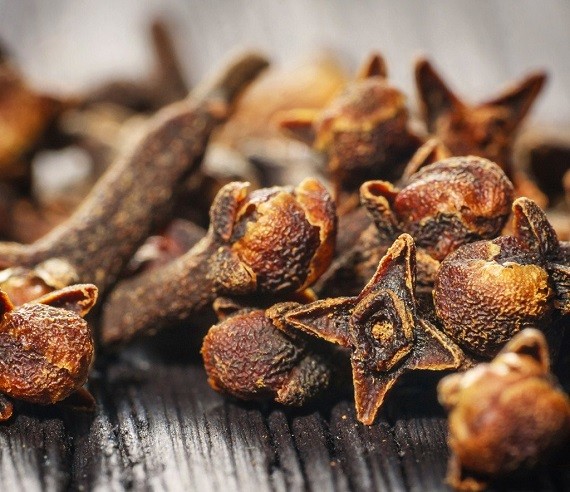(Nigeria Natural Medicine Development Agency)
Clove, botanically known as Syzyigium aromaticum (Fam. Myrtaceae ), is widely recognised all over the world for its medicinal and culinary qualities. It consists of a long calyx that terminates in four spreading sepals, and four unopened petals that form a small central ball. It is called albasa in hausa, kloovu in igbo and ata ile in Yoruba.
Constituents
Cloves contain calories, carbohydrates, fibre, manganese, vitamin K, vitamin C, calcium, magnesium and vitamin E. Other important essential oil constituents of clove oil include acetyl eugenol, betacaryophyllene and vanillin, crategolic acid, tannins, such as bicornin, gallotannic acid, methyl salicylate, the flavonoids eugenin, kaempferol, rhamnetin, and eugenitin, triterpenoids, such as oleanolic acid, stigmasterol, and campesterol and several sesquiterpenes.
Preparations
As a supplement, the spice can either be used in its whole form, ground form, or reduced to its essential oil. It may also be simmered whole in boiling water for five to ten minutes to make a soothing cup of clove tea. It can easily be incorporated into many dishes, beverages, cookies and cakes for its flavour.
Pharmacological actions and medicinal uses
Some research show that the compounds found in cloves can help protect against cancer. Test-tube studies found that clove extract helped stop the growth of tumours and promoted cell death in oesophageal, breast and cervical cancer cells, respectively.

Cloves can help the oesophagus produce more phlegm and act as an expectorant, making coughs less severe and more productive. It can be used for treating bronchitis and asthma. The oil soothes the respiratory tract and also has an anti-inflammatory effect. The oil has been used as an antiemetic with inconsistent clinical results. Use of the oil in dentistry as an analgesic and local antiseptic continues today. It also has been used topically as a counterirritant.
A test-tube study showed that clove essential oil was effective in killing off three common types of bacteria, including E. coli, a strain of bacteria that can cause cramps, diarrhoea, fatigue and even death. Some animal studies show that clove extract and clove oil may increase the production of gastric mucus and help protect against stomach ulcers.
Cloves and nigericin were found to increase the uptake of sugar from the blood into cells, increase the secretion of insulin and improve the function of cells that produce insulin, thereby lowering blood sugar.
Animal studies show that clove extract and manganese may help increase bone mineral density. Studies have shown that cloves can prevent premature ejaculation, enhance testicular function and ultimately boost testosterone levels.
Clove can work as a repellant and insecticide against ants, mosquitoes and fleas. A new application of clove as larvicidal agent is a strategy worth exploring to combat dengue, which is a serious health problem in some tropical countries.
Different studies have confirmed the traditional use of clove as food preservative and medicinal plant, making this plant stand out for different applications
Adverse effects
Overdosing on clove oil may cause liver damage, especially in children. Its use may cause adverse effects if taken orally by people with liver disease, blood clotting and immune system disorders, or food allergies.
Economic potentials
Currently, the marketability of cloves brings a regular income to households, ensuring food security for them. Eugenol, found in clove, is a molecule of interest in a number of commercial sectors and poses great potential for the cosmetic industry, agricultural applications, human and veterinary pharmaceuticals and the food industry.














Thanks for the great website.
Great website … will use this site again in the future 😉 THANK YOU !!!! Greetings from Germany
medications without a doctor’s prescription: https://genericwdp.com/ generic drugs without doctor’s prescription
tadalafil daily use: http://tadalafilonline20.com/ tadalafil pills 20mg
https://waterfallmagazine.com
Tremendous issues here. I’m very happy to see your article.
Thank you so much and I’m taking a look ahead to touch you.
Will you please drop me a e-mail?
Kudoos for the explicit analysis.